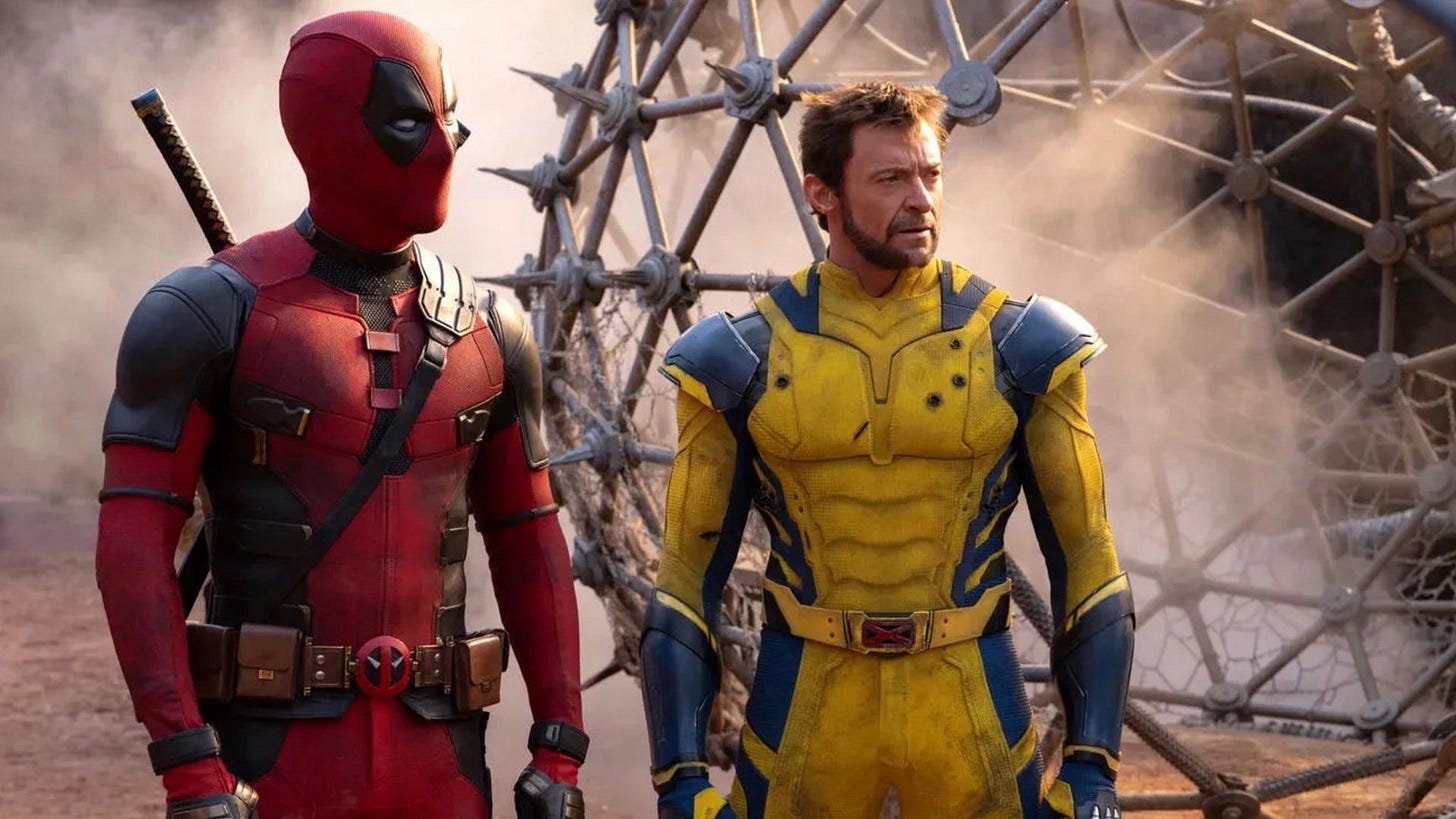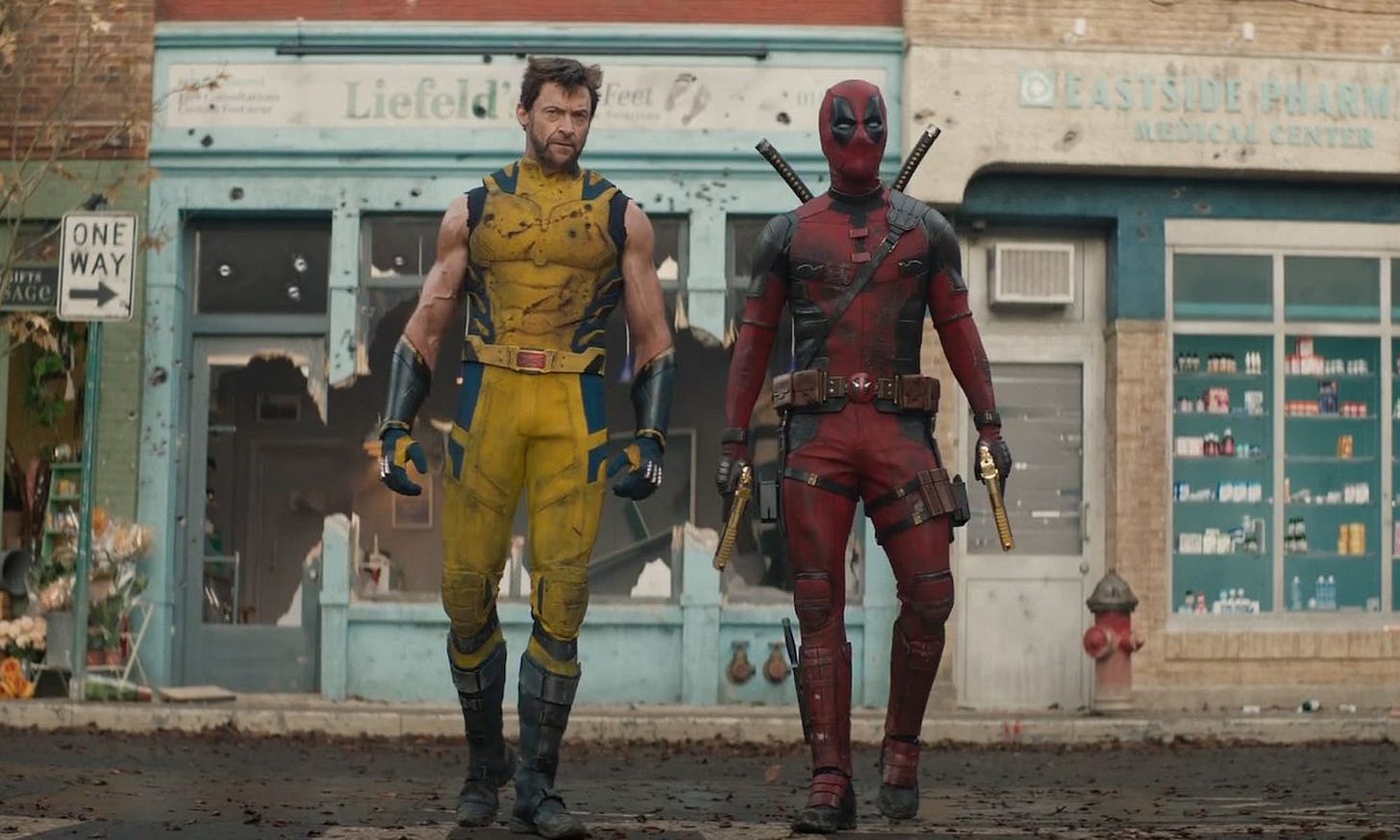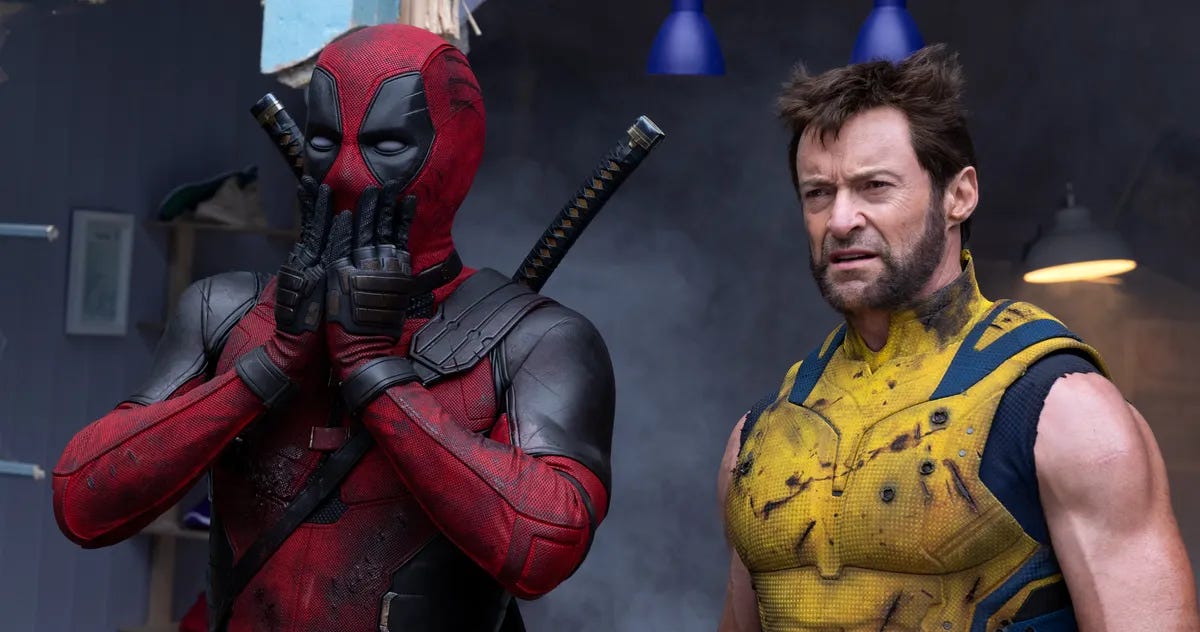Review: "Deadpool & Wolverine" is plenty of fun, and almost something more
Let's f****** go review this movie
Deadpool & Wolverine is undoubtedly the movie of the moment, having already earned enough money to bankroll a small country by the time I got to it on Saturday afternoon, and it seems like the critical reaction is currently running the gamut from “I thought it was pretty fun” to “this is the death of cinema and we’re never getting it back.” I will admit The Discourse left me feeling a bit exhausted on the whole thing before I even made it to the theater, and reluctant to wade into debate on a movie that already seems like a third rail for some people. But I did go see it, and I do have a website where I review movies, so screw it, let’s wade into these waters (not intended as a pun, though I’m sure Deadpool himself would appreciate it). Here’s my reaction:
I thought it was pretty fun. Great? No. But fun.
It’s definitely better than the original Deadpool, which has a lot of good material but barely holds together as a movie, and it’s definitely not as good as Deadpool 2, an underrated gem of a superhero movie that doesn’t get enough love. Deadpool & Wolverine never pulls off a sequence as memorable or surprising as the amazing X-Force massacre in the second film, and director Shawn Levy sure as heck isn’t David Leitch when it comes to action (it says something about Levy’s abilities that the film’s best-choreographed set piece is, visually and conceptually, a straight lift from the infamous hammer brawl in Park Chan-wook’s Oldboy; still, if you’re gonna steal, steal from the best). But Deadpool & Wolvering still had me laughing an awful lot, and it manages that blend of irreverence and surprisingly heartfelt sincerity that makes the whole Deadpool franchise work. You can always feel Ryan Reynolds’ palpable love for the character and enthusiasm for the material shining through, which, when combined with Hugh Jackman’s eternal love and enthusiasm for his own character, makes for a movie that feels, if nothing else, like an earnest effort from all involved. You may or may not like Deadpool, but the people making the movie sure do, and that goes a long way.
Here’s the thing I like most, though: Deadpool & Wolverine was widely hyped as Deadpool’s entry into the Marvel Cinematic Universe, and while that turns out to be true in terms of which general weaknesses the film inherits from its Kevin Feige-produced brethren (the second act really sags, the visuals are very flat, the special effects never rise above ‘competent,’ and often fall below that bar), the film isn’t really an MCU movie at all, but an irreverent Viking funeral for the 20th Century Fox X-Men universe – and, on a broader level, for the much weirder, more unpredictable era of superhero movies the rise of Marvel Studios and Disney’s recent acquisition spree destroyed. It’s not quite what I was expecting, and it works surprisingly well. Marvel has so consumed and homogenized this genre that it truly feels like there’s nowhere else to go; Deadpool & Wolverine certainly bears some of those scars, and the Fox/pre-MCU era of superhero movies definitely had plenty of its own unique problems. But the world before and outside Marvel was also capable of wildly different kinds of tones and triumphs and failures than what we see today, and there’s a good-hearted, loving energy to the way this movie celebrates all of that, the good and the bad alike, and sends it out on a high note. This is a film quite literally set amidst the detritus of 21st-century superhero-adjacent pop culture, a playground of people and properties that fizzled out, were never given a chance, or simply got bought and suppressed by the biggest monopoly in Hollywood history, and for all the humor Deadpool & Wolverine finds on this island of misfit toys, it also has a real affection for this bizarre and bygone era. I have no idea if this movie will even be legible to people watching who were born after the year 2000, but if you lived through these last 25 years, there is something cathartic about it all; it almost feels like closure.
Case in point: Giving Hugh Jackman one more go-round, to show off what was not only the signature performance and character creation of this era, but probably the single best live-action realization of any superhero (his only real competition is Christopher Reeve’s Superman). What I love about Jackman’s work in this film specifically is that he refuses to play any of it as a joke. He takes Wolverine as seriously as he always has, and while the film obviously doesn’t put him in any scenarios as difficult or fraught as James Mangold’s Logan, this much less successfully heroic Wolverine has some moments of real humanity that are legitimately disarming. Deadpool & Wolverine isn’t doing anything radical with its themes of heroism and rising above one’s failures, but it’s competently executing on storytelling 101; this is a film about characters who have literally come to us from another era, who are past their prime in more ways than one, and it tackles those ideas honestly.
And did it warm my cold, cold heart to see Hugh Jackman finally wearing a comics-accurate yellow Wolverine costume, after 24 years, complete with the ridiculous cowl? Yes. Yes it did. Each of us can pretend we’re above all this comic book gibberish right up until the moment a movie does something we’ve always wanted to see, and then we have to just give ourselves over to our inner child and let them have some fun. The costume looks fantastic, Jackman wears it really, really well, and its presence gets some significant moments of pay-off in both the silly and sincere sides of the movie. In that regard, I am a very happy camper. (For what its worth, the updated Deadpool costume also looks outstanding, and allow for even more of Reynolds’ physical performance to come through than in the first two movies, which helps the sensation that we’re watching a live-action cartoon character bounce off the movie’s walls).
So yeah. I liked it. Deadpool & Wolverine is fun. A lot of it worked for me. Some parts didn’t. But that’s true of almost any joke-a-minute comedy like this, that constantly throws yucks at the wall to see what sticks; it’s just in the nature of the genre. I will confess I don’t fully understand the sheer venom from some critics. If this isn’t your brand of humor, I totally get it. This is not for everyone, and that was true of Deadpool and Deadpool 2 as well. Is this third film crawling even deeper inside its own ass than the previous entries? Yes. Of course it is. Channing Tatum shows up to play Gambit, a reference to a movie that kept almost getting made throughout the 2010s until Disney bought Fox and axed the project. If that kind of insider-baseball reference humor irks you, trust me, I understand. I wrote a whole article about how the Evan Peters appearance in WandaVision was the moment I realized this entire ‘Marvel’ thing had gone irrevocably off the rails. So I am not unsympathetic to these complaints. But for whatever it’s worth, I do think it’s different when Deadpool does it, both because you have an extremely meta fourth-wall breaking tone that makes this sort of thing easier to swallow than when WandaVision or The Flash does it, and also because Deadpool actually goes to the effort of getting the real actor to come into the movie and give an actual performance and crack some real jokes, instead of standing still and expecting us all to dorkily point at the screen in guffawing recognition or, worse yet, using CGI to resurrect a dead actor for an even emptier shot of morally compromised dopamine. All I can say is in this specific case, it worked for me. Deadpool & Wolverine is 100% up its own ass, but it knows it and revels in it and puts some real effort into making these jokes actually funny (maybe not maximum effort, as Reynolds likes to say – again, there’s nothing as good as the Brad Pitt cameo in Deadpool 2 – but effort all the same). In this context, I can dig it. If you can’t, go with God. I get it. But I don’t think I can get on board with the “Deadpool & Wolverine is destroying The Cinema” takes.
Here’s the thing, though: if the film tried a little bit harder to destroy cinema, I might like it even more.
Not all cinema, to be clear. Just the superhero genre. Had Levy and Reynolds pressed their feet harder to the anarchic gas pedal, I actually feel there’s the potential for a great movie in here, rather than the reasonably fun one we got. The best scene in Deadpool & Wolverine, for my money, is the very first one, where Deadpool digs up Wolverine’s corpse from the grave left behind in Logan, and then proceeds to use his adamantium-covered bones to slaughter a whole battalion of TVA agents, all set to NSYNC’s “Bye Bye Bye,” complete with Deadpool doing a choreographed dance, and the names of the cast and crew plastered on Wolverine’s exhumed body parts or exploding through the sinew of Deadpool’s victims. It is such an outrageously over-the-top, blindingly excessive, shatteringly literal version of what fans feared Disney would do bringing Jackman’s Wolverine back after the beautiful, note-perfect ending of Logan that it shoots the moon right past juvenile laughs and becomes a surprisingly potent, maybe even poignant visual metaphor: a violent Looney Tunes fever dream expression of the id undergirding 21st-century pop culture’s impulse to constantly keep dredging up the past and make increasingly desperate spectacle out of it – which is, of course, the entire project of not just the MCU, but Disney as a company. If there is an inner life roiling inside Bob Iger, it probably looks exactly like this.
I wish there was more material like that in this movie, that really went for the jugular and used the full possibilities of Deadpool’s postmodern shtick to simultaneously play with and critique the pop culture dystopia Disney is steadily constructing for us. Hearing Deadpool poke fun at Wolverine about having to do this for Disney until he’s 90, or mocking the MCU’s many post-Endgame creative failures, is fun playful ribbing, but that opening? That’s savage. It’s kind of brilliant. I am deeply fascinated by it.
Using the Time Variance Authority (TVA) as the vehicle through which Deadpool and Wolverine come together is fine, but I honestly wish the film had gone even more meta and had Wade summoned by, say, Kevin Feige himself into the real-world Disney offices on our Earth. Just collapse the reality entirely and engage more directly with the ideas animating the film. In his review, Matt Zoller Seitz writes that “the movie incrementally becomes the nine-figure-budgeted superhero action movie equivalent of a Chuck Jones-directed Looney Tunes touchstone like Duck Amuck.” He’s not wrong, necessarily, but I wish Deadpool & Wolverine pushed even further in that direction, really had Wade contesting directly with the hands creating him, the way Daffy does in Duck Amuck. Even with Wade constantly making fun of it, the exposition around the TVA and the multiverse mechanics were the times I most felt my eyes glazing over, and the great Matthew Macfadyen is a bit stranded having to bear the brunt of that dialogue. Since all of it is just a thin layer of metaphor anyway for the idea of multiple studios, creative teams, and corporate entities warring over the pool of intellectual property, why not just rip the band-aid off entirely and make the metaphor the text? Deadpool is the only superhero who can do that, who can completely collapse fiction and reality in on itself, so I say let him. Instead of having an actor as dynamically funny as Macfadyen explain multiversal rules that don’t hold up under a second’s scrutiny (if each universe has one life anchoring its existence, what happened for all the millennia before Logan was born?), let him play Kevin Feige or Bob Iger or a made-up corporate stooge, the exact kind of character he embodied with such blisteringly pathetic gusto on four seasons of Succession.
There’s a version of Deadpool & Wolverine that ends with a Blazing Saddles-esque cartoon battle across the Marvel soundstages in Atlanta, that has them destroy the set of Agatha All Along before running into Robert Downey Jr. guiding a literal dump truck full of money into his driveway to pay for his MCU return, and I think that would actually feel really provocative and interesting, in addition to funny and exciting. I like the climax we get in the movie as it exists, with its truly outstanding use of Madonna’s “Like a Prayer,” and the genuinely sweet note on which the film goes out. But Deadpool as a character gives filmmakers the potential to set fire to the superhero movie the way Mel Brooks did to the Western, and I want to see that potential realized.
But then, Mel Brooks killed the western when he did that, didn’t he? There is a time before Blazing Saddles and a time after Blazing Saddles and that film is a very real part of the reason why all Westerns today are, to some extent, ‘revisionist.’ And if there is one thing Deadpool & Wolverine was never allowed to do – if there was one real rule Disney imposed before letting him into the MCU club (other than no cocaine) – it’s that this film couldn’t kill the superhero genre the way Blazing Saddles drove a stake into the heart of the Western. I am perfectly happy to live with the movie we got, but I find the ‘what if’ endlessly tantilizing. If we’re really going to throw a Viking funeral for the bygone days of the superhero movie, I want the fire to burn bright and vivid and unforgettably hot; and I want it to end with Jackman’s Wolverine, in his sick yellow costume, pissing on the embers of the pyre as the end credits play out in silence, the last man standing, the guy who presided over a full quarter-century of Hollywood IP mining and lived to tell the tale.
A boy can dream.
Read the book 200 Reviews by Jonathan R. Lack in Paperback or on Kindle
Like anime? Listen to the podcast I host with Sean Chapman, JAPANIMATION STATION, where we review all sorts of anime every week. Watch on YouTube or Subscribe wherever you get your podcasts.




